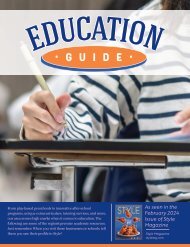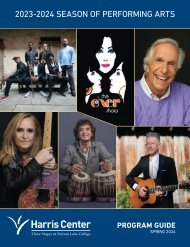Harris Center for the Arts Program Guide 2023-2024
Long envisioned as a critically important element for Folsom Lake College, the visual and performing arts center was initially conceived as a facility to instruct, develop, and guide talented students to become actors, musicians, dancers, visual artists, and behind-the-curtain technicians. In February, 2011 the Center opened as "Three Stages at Folsom Lake College" and by the end of its second full season it had already attracted over 300,000 patrons to its offerings. The Harris Center for the Arts seeks to enrich the lives of people throughout California’s capital region by providing venues and opportunities to experience artistic work, celebrate cultural traditions and participate in the creative process.
Long envisioned as a critically important element for Folsom Lake College, the visual and performing arts center was initially conceived as a facility to instruct, develop, and guide talented students to become actors, musicians, dancers, visual artists, and behind-the-curtain technicians. In February, 2011 the Center opened as "Three Stages at Folsom Lake College" and by the end of its second full season it had already attracted over 300,000 patrons to its offerings.
The Harris Center for the Arts seeks to enrich the lives of people throughout California’s capital region by providing venues and opportunities to experience artistic work, celebrate cultural traditions and participate in the creative process.
Create successful ePaper yourself
Turn your PDF publications into a flip-book with our unique Google optimized e-Paper software.
TISRA<br />
Zakir Hussain, Sabir Khan, and Debopriya Chatterjee<br />
Wednesday, April 24, <strong>2024</strong>; 7:30pm<br />
BIO Tabla virtuoso Zakir Hussain is proud to present TISRA<br />
(three) with two of India’s finest young musicians,<br />
Sabir Khan and Debopriya Chatterjee. This unique trio is<br />
comprised of tabla, sarangi, and bansuri (bamboo flute), a<br />
combination not often heard on <strong>the</strong> classical stage. Sarangi<br />
and bansuri each have roots in ancient India and its mythology;<br />
both are also folk instruments.<br />
TISRA showcases <strong>the</strong> rich folk and classical traditions of <strong>the</strong><br />
Indian states of Uttar Pradesh, Rajasthan, and Punjab. It is<br />
widely accepted that <strong>the</strong> musical influence of Rajasthani gypsies<br />
has been heard far beyond <strong>the</strong> borders of India, and that Uttar<br />
Pradesh incorporated <strong>the</strong> folk music <strong>for</strong>ms of Nepal, Bhutan,<br />
and Tibet into its music. This colorful mix combined with Indian<br />
classical music and <strong>the</strong> rich rhythm repertoire of Punjab<br />
makes <strong>for</strong> a compelling offering that TISRA brings to audiences<br />
in <strong>the</strong> United States. Moreover, <strong>the</strong> trio intends to initiate a<br />
conversation between <strong>the</strong> sarangi, with its close resemblance to<br />
<strong>the</strong> human voice, and <strong>the</strong> bansuri, a breath instrument.<br />
Zakir Hussain is <strong>the</strong> pre-eminent classical tabla virtuoso<br />
of our time and is appreciated as one of <strong>the</strong> world’s most<br />
esteemed and influential musicians, one whose mastery of his<br />
percussion instrument has taken it to a new level transcending<br />
cultures and national borders. Along with his legendary fa<strong>the</strong>r<br />
and teacher, Ustad Allarakha, he has elevated <strong>the</strong> status of <strong>the</strong><br />
tabla both in India and around <strong>the</strong> world.<br />
Sabir Khan is one of India’s most talented and sought-after<br />
musicians of <strong>the</strong> present day. His instrument is <strong>the</strong> sarangi,<br />
a bowed instrument said to possess <strong>the</strong> sound closest to <strong>the</strong><br />
human voice. He is <strong>the</strong> son of <strong>the</strong> great sarangi player/vocalist<br />
Padma Bhushan Ustad Sultan Khan, <strong>the</strong>ir family belonging to<br />
<strong>the</strong> Sikar gharana (school) of music, which has given several<br />
stalwarts to Indian classical music, including his greatgrandfa<strong>the</strong>r<br />
Ustad Azim Khansahib, a court musician at Sikar<br />
in Rajasthan.<br />
Debopriya Chatterjee started her initial flute training under<br />
<strong>the</strong> guidance of <strong>the</strong> late Pandit Bholanath Prasanna Ji of<br />
Allahabad. Her quest to express <strong>the</strong> depth and richness of<br />
Hindustani classical music, and of her chosen instrument, <strong>the</strong><br />
bansuri (bamboo flute), brought her to <strong>the</strong> feet of her guru, <strong>the</strong><br />
great exponent of <strong>the</strong> Maihar Senia Gharana Padmavibhushan<br />
Pandit Hariprasad Chaurasia.<br />
36 <strong>2023</strong>-<strong>2024</strong> PROGRAM GUIDE www.harriscenter.net

















